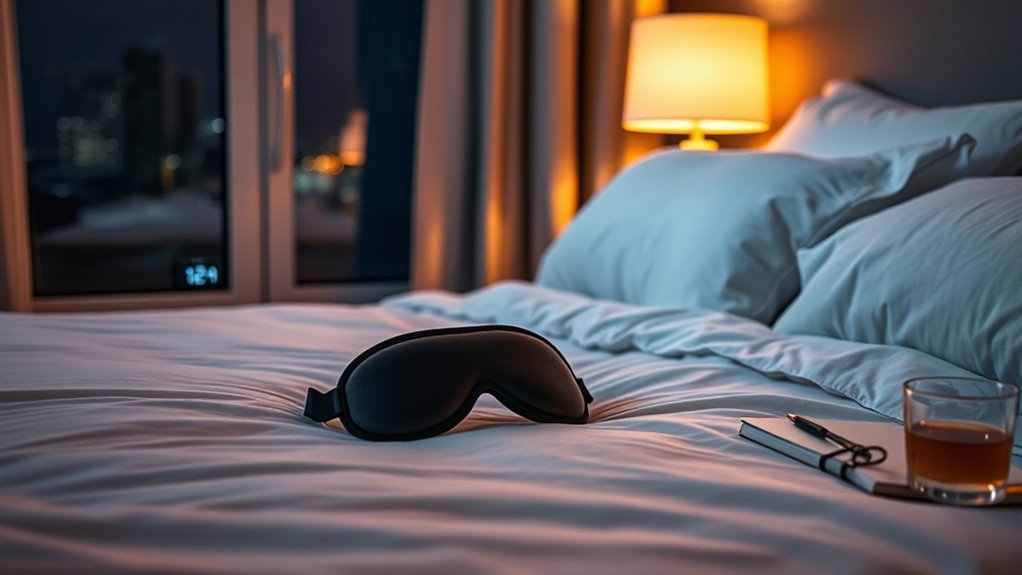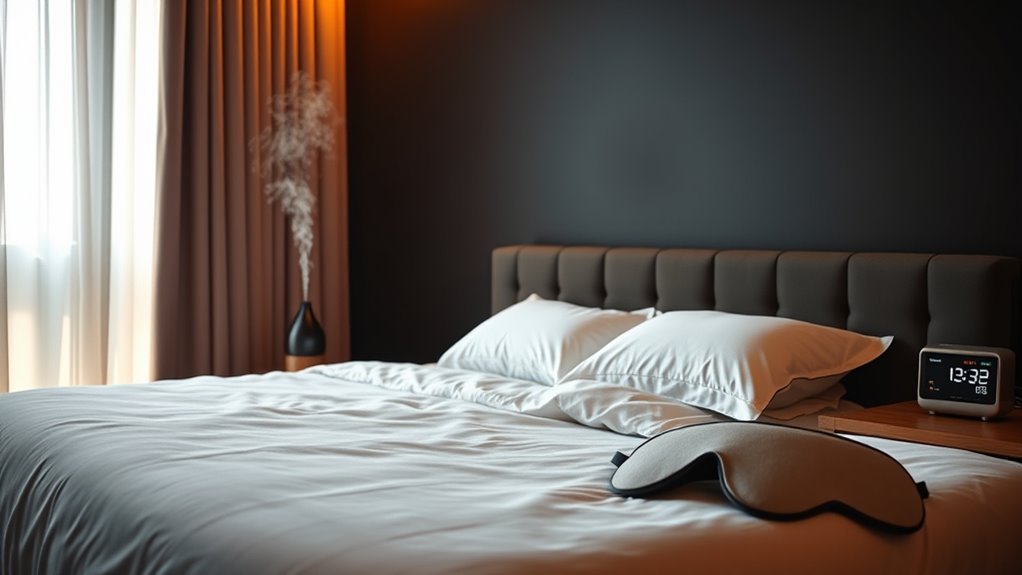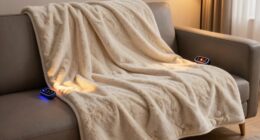To improve your sleep as a shift worker, focus on managing light exposure by using bright light therapy during your night shift and avoiding light before bed with blackout curtains or sunglasses. Enhance indoor air quality with air purifiers, stick to a consistent sleep schedule, and create a dark, quiet, cool environment for rest. Developing these habits can make a significant difference, and if you keep exploring, you’ll discover more effective strategies to support your sleep.
Key Takeaways
- Use bright light therapy during night shifts and wear sunglasses or blackout curtains to minimize light exposure before sleep.
- Maintain a consistent sleep schedule, even on days off, and create a dark, quiet, and cool sleep environment.
- Practice good sleep hygiene by avoiding caffeine, heavy meals, and screens before bedtime, and develop relaxing pre-sleep routines.
- Improve indoor air quality with HEPA air purifiers to reduce allergens and promote restful sleep.
- Stick to routine and environment adjustments to reinforce circadian rhythm and enhance sleep quality over time.

Many shift workers find it challenging to get quality sleep, but implementing targeted strategies can make a significant difference. One effective approach is using light therapy to help regulate your internal clock. Light exposure plays a crucial role in signaling your body when it’s time to be awake or asleep. During night shifts, you can use a lightbox or specialized lamps designed for light therapy to simulate natural daylight. When you finish work, spending time in bright light can help you stay alert and reinforce your daytime schedule. Conversely, in the morning before heading to sleep, minimize exposure to bright light by wearing sunglasses or using blackout curtains. This helps signal to your brain that it’s time to wind down, making it easier to fall asleep despite the unconventional hours. Incorporating light therapy into your routine requires consistency, so try to stick to a regular schedule, even on your days off, to support your circadian rhythm. Additionally, using air purifiers with HEPA filters can improve indoor air quality, reducing allergens and irritants that might disrupt your sleep.
Alongside light therapy, practicing good sleep hygiene is essential for improving your sleep quality. Sleep hygiene involves creating an environment and routines that promote restful sleep. Start by establishing a consistent sleep schedule; going to bed and waking up at the same times daily helps stabilize your internal clock. Make your sleeping environment as dark and quiet as possible—use blackout curtains and earplugs if needed. Keep your bedroom cool, as a lower temperature can enhance sleep quality. Avoid caffeine, heavy meals, and alcohol close to bedtime, since these can interfere with your ability to fall asleep and stay asleep. Establish a calming pre-sleep routine, such as reading or taking a warm bath, to signal to your body that it’s time to wind down. Limiting screen time before bed is also essential because the blue light emitted by phones and computers can suppress melatonin production, making it harder to fall asleep. Instead, consider relaxing activities that don’t involve screens.
Incorporating light therapy and adhering to good sleep hygiene practices can greatly improve your sleep despite the challenges posed by shift work. Consistency is key—by sticking to a routine and creating an ideal sleep environment, you help your body adjust to your schedule. Remember, your sleep environment, routines, and light exposure are tools you can control to make your sleep more restorative. It might take some time to see results, but with persistence, you’ll find it easier to rest and recover, ultimately boosting your energy and well-being during your shifts.
Frequently Asked Questions
How Do Shift Workers Maintain Social Relationships?
You can maintain social relationships by staying engaged in social activities and using communication strategies like regular calls or messages. Prioritize quality time with friends and family when you’re off shift, and be honest about your schedule to manage expectations. Scheduling virtual meetups or quick check-ins helps you stay connected, even if your hours are unconventional. Consistent effort and clear communication keep your relationships strong despite your unique work hours.
What Are the Long-Term Health Risks of Irregular Sleep?
Your body’s internal clock, like a delicate orchestra, can fall out of sync with irregular sleep, leading to circadian disruption. This chaos increases your risk of serious health issues over time, including metabolic consequences like weight gain and diabetes. When sleep patterns are unpredictable, your health suffers silently, like a slow leak in a boat, eventually threatening your well-being and longevity. Staying consistent helps keep your health harmony intact.
How Can Shift Workers Prevent Burnout and Fatigue?
To prevent burnout and fatigue, you should prioritize work-life balance by setting clear boundaries and taking regular breaks. Practice stress management techniques like deep breathing or mindfulness to stay centered. Maintain a healthy diet, stay hydrated, and get some physical activity, even during short breaks. Ensuring you get quality sleep when off-shift helps recharge your energy. These steps help you stay resilient and keep your performance consistent.
Are There Specific Diets That Support Better Sleep?
Think of your diet as a toolbox for better sleep. Sleep-promoting foods like almonds, cherries, and warm milk supply natural melatonin and magnesium, helping you unwind. Dietary supplements such as melatonin or magnesium can also support restful nights. Incorporating these into your routine, especially after night shifts, can make a real difference. You’re giving your body the building blocks it needs for quality sleep, even when schedules are unpredictable.
How Does Caffeine Consumption Affect Shift Workers’ Sleep Quality?
Caffeine consumption can markedly impact your sleep quality, especially if you’re a shift worker. It can lead to caffeine dependency, making it harder to fall asleep after your shift. Caffeine intake, particularly close to bedtime, causes sleep disruption by delaying sleep onset and reducing REM sleep. To improve sleep, limit caffeine, especially in the hours before sleep, and avoid relying on it to stay alert during your shift.
Conclusion
By implementing these strategies, you’ll find it easier to catch quality sleep despite your unconventional hours. Remember, even in this fast-paced era, good rest is timeless—think of it as your secret weapon, like a knight’s armor in a digital age. Stay consistent with your routine, prioritize your sleep environment, and listen to your body’s signals. With a little effort, you’ll master the art of restful sleep, no matter when your shift ends.









